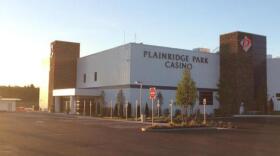MGM Resorts International is planning to start demolishing buildings in mid-January to clear the site in downtown Springfield where the company intends to build the first casino in western Massachusetts. 2015 was a year of delay and downsizing for the casino project.
When MGM held the ceremonial groundbreaking for the Springfield casino in late March with the former Zanetti school building as the backdrop for photographs with construction workers and machinery no one would have predicted the building would still be standing nine months later.
But what has been billed as the largest economic development project in the history of western Massachusetts, and the biggest single construction project in Springfield in a generation, sputtered along for most of this year tangled in regulatory red tape and protracted negotiations over the fates of historic buildings that needed to be razed or moved.
As the delays mounted, so did MGM’s costs. By the end of the year, the project’s budget had increased by $150 million, even as MGM redesigned the hotel-casino complex to keep expenses in check. Top MGM officials were also called on to repeatedly refute scuttlebutt that the casino industry giant was looking for a way out of the Springfield project.
" We have not gone anywhere, we will not go anywhere," assured MGM President Bill Hornbuckle during a visit to Springfield in October.
A delay of at least a year in the start of the Interstate 91 viaduct reconstruction in Springfield also impacted MGM’s plans. Citing likely traffic disruptions due to the highway work, MGM Springfield President Mike Mathis announced a revised construction schedule that calls for the casino to open on Sept. 5, 2018, a year later than planned.
" We feel strongly this is the right decision. It is a difficult decision," Mathis said at meeting of the Massachusetts Gaming Commission in June.
In an effort to control what Mathis called “skyrocketing” construction costs, MGM proposed to scrap a 25-story glass façade hotel tower from the project, and replace it with a six-story hotel, still with 250 rooms. Other changes were proposed that would end up shrinking the total square footage of the complex by roughly 10 percent.
" We remain committed to everything we campaigned for, that is 3,000 jobs, 2,000 construction jobs and a world-class resort," said Mathis.
The initial disclosure of many of the changes through a 100 page regulatory filing caused friction between MGM and the casino project’s biggest booster, Springfield Mayor Domenic Sarno, who was blindsided by the proposed downsizing.
" I find it incomprehensible," Sarno said at a news conference after the downsizing plans were reported in the press.
MGM officials, led by Chief Executive James Murren, insist the design changes will make for a better project.
" This is truly an epic and groundbreaking endeavor," said Murren.
The controversial changes proposed by MGM will be scrutinized in the weeks ahead not only in Springfield, but also in Boston by state casino industry regulators. Massachusetts Gaming Commissioner Enrique Zuniga questions if the design changes will make the casino less attractive to high rollers and thus reduce the gambling revenue.
" I am worried a little bit," said Zuniga.
MGM officials say the only thing that would impact revenue projected to flow from the gambling floor of the Springfield casino is competition. And the specter of competition still looms just over the state line in Connecticut.
The two Native American tribes that operate Connecticut’s two casinos partnered in 2015 and announced plans to build a third casino to directly compete with MGM Springfield. MGM filed a lawsuit in federal court in a bid to block the competition.
After pushing back a December 15th deadline, the tribes say they expect to announce a location for the casino by the end of 2016.








